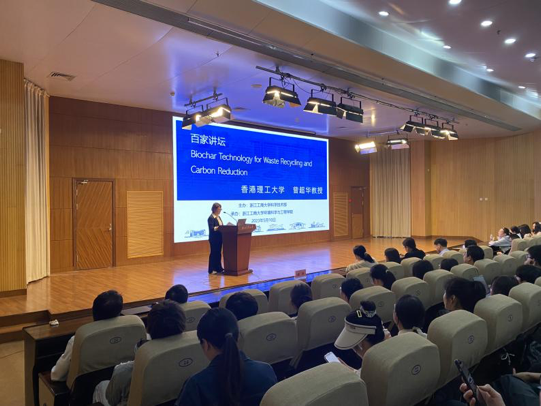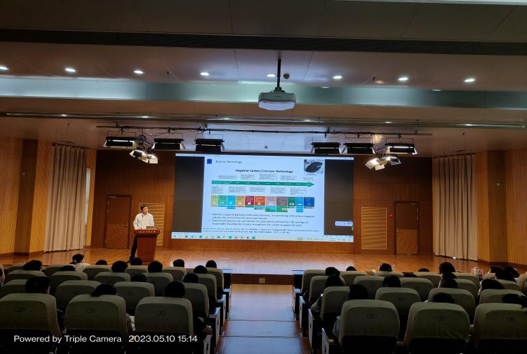|
In the afternoon of 10 May 2023,
Professor Chaohua Zeng from the Hong Kong Polytechnic University was invited to
give a lecture entitled "Biochar Technology for Waste Recycling and Carbon
Reduction" at the Lecture Hall on the 2nd floor of the General Building of
Zhejiang Gongshang University. The lecture was hosted by the Department of
Science and Technology of Zhejiang Gongshang University, and organized by the Department
of Environmental Science and Engineering, and presided over by Meizhen Wang,
Executive Dean of the School of Environmental Science and Engineering.

Professor Zeng Chao-Hua is a Professor
in the Department of Civil and Environmental Engineering of the Hong Kong
Polytechnic University, Director of the Research Centre for Environmental
Technology and Management, and a Fellow of the Royal Society of Chemistry. His
main postgraduate studies include material pyrolysis and functionalised biochar
utilisation, heavy metal migration and transformation mechanisms and
environmental toxicology, environmentally sound utilisation of incineration
ash, and low carbon and efficient biorefining. He is an Associate Editor of 8
SCI journals including Sci. Total. Environ. and an Editorial Board member of 8
SCI journals including Bioresour. Technol. and an Invited Editor of more than
10 SCI journals including Environ. Int. and has been awarded as a Top Editor of
Publons worldwide. He is the chairman of 4 international conferences including
the Asia Pacific Biocarbon Conference and co-chairman of 6 international
conferences; he has received international awards such as the Young Scientist
Award of the International Bioprocess Society.

During the lecture, Professor Zeng
Chao-Hua first introduced Hong Kong's experience in the pyrolysis and
functionalisation of biomass waste, high value of kitchen waste and the
environmentally sound incineration of fly ash. Afterwards, focusing on biochar
functionalisation, he introduced the application of biochar-loaded catalysts in
the high value conversion of kitchen waste and the degradation of new pollutants,
giving two examples of conducting environmental catalysis research in two
dimensions: precise pathway regulation and catalyst morphological
transformation, respectively. Finally, students and teachers discussed with
Professor Chaohua Zeng in depth about
biochar fictionalization and environmental catalysis. The venue was full of
excitement and lively discussions. The high quality academic exchange not only
broadened the horizons of students and teachers, but also contributed to the
rapid growth of our discipline.
|